How Personality Affects the Way Individuals Experience and Interpret Physical Symptoms?
Keywords:
personality traits, symptom interpretation, neuroticism, health anxiety, cognitive biases, behavioral responses, qualitative researchAbstract
This study aimed to explore how personality traits influence individuals' experiences and interpretations of physical symptoms. This qualitative study employed semi-structured interviews with 29 participants recruited through online platforms. Theoretical saturation guided data collection, ensuring comprehensive exploration of symptom perception variations. Interviews were transcribed verbatim and analyzed using thematic analysis with NVivo software. The study identified key themes related to emotional responses, cognitive interpretations, behavioral tendencies, and the role of personality traits in shaping symptom perception. The results indicated that neuroticism was associated with heightened symptom sensitivity, emotional amplification, and increased health anxiety, whereas conscientious individuals exhibited structured symptom monitoring and proactive health behaviors. Extraverted participants were more likely to express symptoms openly and seek social reassurance, while introverted individuals internalized their distress and engaged in self-directed coping. Cognitive patterns varied, with some individuals engaging in logical symptom analysis while others exhibited anxiety-driven health rumination and negative interpretation biases. Stress and psychological distress reinforced symptom perception, contributing to a bidirectional relationship between emotional states and physical symptoms. Behavioral responses to symptoms included frequent medical reassurance-seeking, avoidance behaviors, and reliance on alternative health approaches, demonstrating the diverse ways personality shapes health-related decision-making. The findings highlight the critical role of personality in shaping symptom experiences and interpretation, underscoring the need for personalized healthcare approaches. Understanding personality-related differences in symptom perception can inform tailored interventions that address cognitive biases, emotional responses, and behavioral tendencies.
Downloads

Downloads
Additional Files
Published
Submitted
Revised
Accepted
Issue
Section
License
Copyright (c) 2025 Nadereh Saadati (Corresponding Author); Laya Samiei (Author)

This work is licensed under a Creative Commons Attribution-NonCommercial 4.0 International License.






